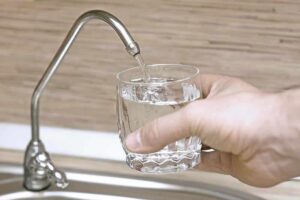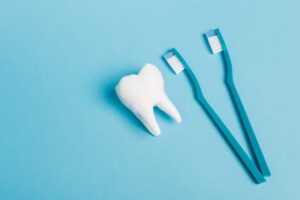Undergoing dental implant surgery is an exciting prospect. Damaged or missing teeth detract from your quality of life and having them all freshly replaced offers a new lease on a pain-free reality where you can eat a diverse and healthy diet, improve jaw bone density and facial structure, and flash those pearly whites with confidence.
That being said, receiving new full-arch or full mouth dental implants represents a major life decision and a significant surgical procedure. Even with Doctors Implants’ 99% implant success rate and revolutionary 6 Hour Smile, many patients still wonder about what to expect in terms of the recovery process.
Under the expert guidance of our leading Oral and Maxillofacial Surgeons, most of our patients report that recovering from dental implant surgery is actually quicker and less painful than they anticipated. That’s great news.
The even better news? By implementing the practices below and sticking to your surgeon’s recommendations, you can substantially improve your recovery time and outcomes while also enhancing your comfort and wellness. Let’s take a closer look!
Tips To Speed Up the Healing Process After Dental Implant Surgery
After receiving your 6 Hour Smile, you’ll enter the Post-Operative phase of recovery. For most patients, the initial healing phase after surgery takes approximately 10-12 weeks. Ten days after surgery, you’ll see your surgeon for a check-in to ensure that your recovery is progressing as expected and again after 8-12 weeks for a Healed Records appointment.
The Restorative Phase of healing typically takes about 5-7 months. Once your permanent zirconia teeth have been inserted at your Final Delivery appointment, your implant journey will be complete, though regular cleaning and maintenance will still be crucial (see below).
As you progress throughout your healing process, focus on cultivating the following routines and habits:
Stay Hydrated

Staying hydrated is important anytime, but particularly so after dental implant surgery. Aside from the obvious benefits of keeping you energized and feeling your best, proper hydration also flushes out toxins (which is important after oral surgery), and helps you avoid unnecessary complications like headaches, constipation, and fatigue.
Water and other clear fluids will be your best choices throughout your recovery period. To be avoided are sugary drinks like soda and juice as well as large amounts of caffeinated beverages, which may actually contribute to dehydration. Alcohol can negatively impact your healing process and should not be consumed in the initial healing phases after implant surgery. Speak with your surgeon for more specifics.
Eat Soft Foods
The healing teeth you’ll have for the first several months after surgery will require you to eat a softer diet than normal. Using force to chew hard or sticky foods can result in a broken set of healing teeth, a prolonged healing process, or both. It can also misalign your bite, causing further discomfort and complications.
At Doctors Implants, we strongly recommend not consuming any foods that you can’t comfortably cut through with a plastic fork throughout your recovery and restorative period.
Soft food suggestions include, but are not limited to:
- Soups
- Protein Shakes
- Waffles and Pancakes
- Ground Meat
- Eggs/Omelets
- Bananas
- Puddings
- Mashed Vegetables
- Rice
- Yogurt
- Beans
- Well-cooked Pasta
Foods to avoid include, but are not limited to:
- Foods that require tearing when biting (pizza crust, bagels, hamburger with bun, etc.)
- Crunchy foods (nuts, chips, ice, hard candy)
- Gum
- Ice Cubes
- Crunchy raw fruits and vegetables (carrots, apples, broccoli, etc.)
- Fruits and vegetables with skin on the outside (tomatoes, grapes, etc.)
- Sweet and alcoholic beverages
Avoid Smoking
Smoking is commonly known to be bad for your overall health, including your oral health. After a dental implant procedure it can be detrimental.
Smoking lowers your blood oxygenation, slows blood flow, healing, and dramatically increases the risk of dental implant complications and/or failure. At Doctors Implants, we do not financially cover complications that arise as a result of patients smoking after surgery.
If you are a smoker looking to receive full mouth dental implants, you’ll need to be willing and able to stop smoking for a week prior to surgery and at least six weeks after surgery. Quitting permanently is ideal.
Rinse With Salt Water
In the first 10 days following implant surgery, you’ll need to rinse your mouth 10 times per day with salt water. Salt water rinses help decrease swelling and pain as well as remove bacteria and debris from the mouth.
Dissolve 1/2 a teaspoon of salt in 8 oz. of warm water and gently swish throughout your mouth every hour while awake.
Take Pain Medications As Advised
Your Oral and Maxillofacial Surgeon will create a personalized pain management plan for you based on your specific needs and circumstances. Be sure to fill any prescriptions immediately and to take pain relief medications exactly as prescribed to ensure a comfortable recovery experience. Don’t hesitate to contact our clinic with any questions or concerns.

Practice Proper Dental Hygiene
During the 10 days immediately following surgery, you’ll brush your new teeth morning and night with a soft bristle toothbrush and a non-abrasive, non-gel toothpaste.
Starting on approximately the 11th day after surgery, you’ll be able to begin using a Waterpik on the soft setting to clean your teeth. Remember to be meticulous about cleaning your teeth after every meal, and even more often as necessary.
Maintaining a careful and consistent oral hygiene routine throughout your recovery period and beyond can substantially improve the function, aesthetics, and longevity of your dental implants.
Use an Ice Pack
Ice packs or cold compresses can help reduce pain and swelling in the days following dental implant surgery. Apply cold to the outside of your face for 15-20 minutes at a time as needed. Contact your surgeon with any questions or concerns.
How Do I Take Care of My Dental Implants After They Are Healed?
Once your dental implants have completely healed and you’ve received your permanent zirconia teeth, ongoing care and maintenance is essential to keep them in tip-top shape. At Doctors Implants, we recommend the following:
- Three month check-up where x-rays will be taken, implants evaluated, and prosthetic screws properly tightened.
- Annual maintenance visits where x-rays will be taken, your overall oral health and hygiene will be evaluated, and teeth will be thoroughly cleaned.
- Maintain a healthy diet and lifestyle. Avoid tobacco and alcohol, stay hydrated, and contact our clinic immediately with any questions or concerns.
- Practice excellent oral hygiene. Use your Waterpik morning and evening and take consistently good care of your teeth and gums.
- Stay positive! Enjoying your new teeth can contribute to improved mental health and wellness outcomes.
When Can I Resume Regular Activity?
Most patients are able to resume regular activities once the initial 10-day healing period has passed. Non-strenuous activities may be resumed much sooner, while high-impact exercise routines (especially those that involve a risk of impact or trauma to the face) should be eased back into more slowly.
Once your permanent teeth have been installed (5-7 months post-surgery), they will look, feel, and function just like natural teeth—often even better! At this point, you’ll be able to return to even the most strenuous of activities (if you haven’t already).
Doctors Implants’ 6 Hour Smile
Are you ready to begin your journey to a fresh smile and improved oral health? Contact the exceptional team at Doctors Implants to learn more about our groundbreaking 6 Hour Smile procedure and schedule your free consultation appointment today! We look forward to hearing from you at 1-844-SMILES2.